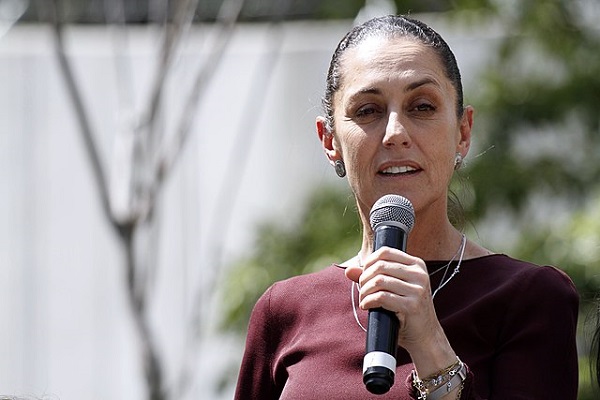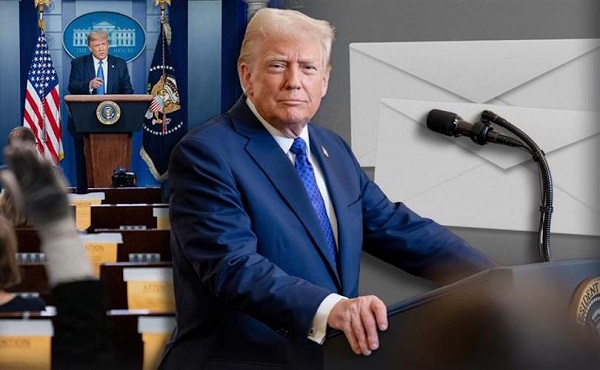International
Mexico to reform constitution after Trump designates cartels as terrorist organizations

 MxM News
MxM News
Quick Hit:
Mexican President Claudia Sheinbaum announced plans to propose constitutional reforms following U.S. President Donald Trump’s designation of six Mexican drug cartels as foreign terrorist organizations.
Key Details:
- The U.S. designation targets six Mexican drug cartels as foreign terrorist organizations, published in the Federal Register on Thursday.
- Sheinbaum’s proposed reforms would protect Mexico’s sovereignty and limit foreign agents’ operations within the country.
- The reforms would also impose severe penalties on foreigners involved in gun trafficking, addressing Mexico’s longstanding demand for stricter U.S. gun control measures.
Diving Deeper:
Mexican President Claudia Sheinbaum revealed plans to propose constitutional reforms in response to the Trump administration’s recent designation of six Mexican drug cartels as foreign terrorist organizations. The U.S. action, announced on Thursday, has raised concerns in Mexico about potential military intervention on its soil, an idea Mexico strongly opposes.
“The Mexican people will not accept under any circumstances interventions, interference or any other act from abroad that could be harmful to the integrity, independence and sovereignty of the nation,” Sheinbaum asserted during her daily press briefing. She emphasized that Mexico would not allow outside involvement in investigations or prosecutions without authorization and collaboration from the Mexican government.
The U.S. designations are part of a broader effort to increase pressure on the cartels by treating them similarly to groups with political motives rather than purely economic interests. The decision follows a Jan. 20 executive order by President Donald Trump, aiming to curb cartel operations that contribute to violence and instability in the region.
Sheinbaum’s proposal seeks to solidify existing restrictions on foreign agents operating in Mexico, which were first introduced by her predecessor, former President Andrés Manuel López Obrador. Those laws limited the independence of foreign agents, requiring Mexican authorities to be informed of their movements. By enshrining these restrictions in the constitution, Sheinbaum aims to further safeguard Mexico’s sovereignty.
Additionally, Sheinbaum plans to introduce severe penalties for foreigners involved in gun trafficking, a longstanding issue in U.S.-Mexico relations. Mexico has repeatedly called on the U.S. to do more to prevent the flow of firearms from American gun shops and manufacturers into Mexico. With majorities in both chambers of Congress, Sheinbaum’s Morena party and its allies are well-positioned to pass the proposed constitutional amendments.
“What we want to make clear in the face of this designation is that we do not negotiate sovereignty,” Sheinbaum said, signaling her firm stance against any potential foreign military action on Mexican territory. As the situation develops, the proposed reforms are likely to shape Mexico’s domestic and international policy landscape, especially in its ongoing relationship with the U.S. under President Trump’s administration.
Daily Caller
AI Needs Natural Gas To Survive


From the Daily Caller News Foundation
By David Blackmon
As recent studies project a big rise in power generation demand from the big datacenters that are proliferating around the United States, the big question continues to focus in on what forms of generation will rise to meet the new demand. Most datacenters have plans to initially interconnect into local power grids, but the sheer magnitude of their energy needs threatens to outstrip the ability of grid managers to expand supply fast enough.
This hunger for more affordable, 24/7 baseload capacity is leading to a variety of proposed solutions, including President Donald Trump’s new executive orders focused on reviving the nation’s coal industry, scheduled to be signed Tuesday afternoon. But efforts to restart the permitting of new coal-fired power plants in the US will require additional policy changes, efforts which will take time and could ultimately fail. In the meantime, datacenter developers find themselves having to delay construction and completion dates until firm power supply can be secured.
Datacenters specific to AI technology require ever-increasing power loads. For instance, a single AI query can consume nearly ten times the power of a traditional internet search, and projections suggest that U.S. data center electricity consumption could double or even triple by 2030, rising from about 4-5% of total U.S. electricity today to as much as 9-12%. Globally, data centers could see usage climb from around 536 terawatt-hours (TWh) in 2025 to over 1,000 TWh by 2030. In January, a report from the American Security Project estimated that datacenters could consume about 12% of all U.S. power supply.
Obviously, the situation calls for innovative solutions. A pair of big players in the natural gas industry, Liberty Energy and Range Resources, announced on April 8 plans to diversify into the power generation business with the development of a major new natural gas power plant to be located in the Pittsburgh area. Partnering with Imperial Land Corporation (ILC), Liberty and Range will locate the major power generation plant in the Fort Cherry Development District, a Class A industrial park being developed by ILC.
“The strategic collaboration between Liberty, ILC, and Range will focus on a dedicated power generation facility tailored to meet the energy demands of data centers, industrial facilities, and other high-energy-use businesses in Pennsylvania,” the companies said in a joint release.
Plans for this new natural gas power project follows closely on the heels of the March 22 announcement for plans to transform the largest coal-fired power plant in Pennsylvania, the Homer City generating station, into a new gas-fired facility. The planned revitalized plant would house 7 natural gas turbines with a combined capacity of 4.5 GW, enough power 3 million homes.
Both the Homer City station and the Fort Cherry plant will use gas produced out of the Appalachia region’s massive Marcellus Shale formation, the most prolific gas basin in North America. But plans like these by gas companies to invest in their own products for power needs aren’t isolated to Pennsylvania.
In late January, big Permian Basin oil and gas producer Diamondback Energy told investors that it is seeking equity partners to develop a major gas-fired plan on its own acreage in the region. The facility would primarily supply electricity to data centers, which are expected to proliferate in Texas due to the AI boom, while also providing power for Diamondback’s own field operations. This dual-purpose approach could lower the company’s power costs and create a new revenue stream by selling excess electricity.
Prospects for expansion of gas generation in the U.S. received a big boost in January when GE Vernova announced plans for a $600 million expansion of its manufacturing capacity for gas turbines and other products in the U.S. GE Vernova is the main supplier of turbines for U.S. power generation needs. The company plans to build 37 gas power turbines in 2025, with a potential increase to over 70 by 2027, to meet rising energy demands.
The bottom line on these and other recent events is this: Natural gas is quickly becoming the power generation fuel of choice to feed the needs of the expanding datacenter industry through 2035, and potentially beyond. Given that reality, the smart thing to do for these and other companies in the natural gas business is to put down big bets on themselves.
David Blackmon is an energy writer and consultant based in Texas. He spent 40 years in the oil and gas business, where he specialized in public policy and communications.
International
Trump White House will ignore reporter emails that include ‘preferred pronouns’ in signature

From LifeSiteNews
“Any reporter who chooses to put their preferred pronouns in their bio clearly does not care about biological reality or truth and therefore cannot be trusted to write an honest story”
The White House will ignore all emails from reporters which include preferred gender pronouns in their email signatures according to Press Secretary Karoline Leavitt.
“Any reporter who chooses to put their preferred pronouns in their bio clearly does not care about biological reality or truth and therefore cannot be trusted to write an honest story,” Leavitt wrote in response to a request for comment from the New York Times.
The practice of citing one’s preferred gender pronouns, which is increasingly prevalent among leftists, stems from gender ideology, the idea that people have a “gender identity” that is distinct from their sex. Thus, for example, women who identify as males may include the gender pronouns “he/him” in their email signature or other identifiers.
Leavitt had previously stated to a NYT reporter who inquired about the potential closure of a climate research observatory, “As a matter of policy, we do not respond to reporters with pronouns in their bios.”
The New York Times reported that Katie Miller, senior advisor for the Department Of Government Efficiency (DOGE), had weeks prior declined another question from a Times reporter, for the same reason.
“As a matter of policy, I don’t respond to people who use pronouns in their signatures as it shows they ignore scientific realities and therefore ignore facts,” Miller said in an email. In a separate message, she noted, “This applies to all reporters who have pronouns in their signature.”
-

 2025 Federal Election2 days ago
2025 Federal Election2 days agoRCMP memo warns of Chinese interference on Canadian university campuses to affect election
-

 2025 Federal Election1 day ago
2025 Federal Election1 day agoResearchers Link China’s Intelligence and Elite Influence Arms to B.C. Government, Liberal Party, and Trudeau-Appointed Senator
-

 Alberta2 days ago
Alberta2 days agoAlberta takes big step towards shorter wait times and higher quality health care
-

 Business2 days ago
Business2 days agoTrump raises China tariffs to 125%, announces 90-day pause for countries who’ve reached out to negotiate
-

 2025 Federal Election1 day ago
2025 Federal Election1 day agoThe status quo in Canadian politics isn’t sustainable for national unity
-

 2025 Federal Election1 day ago
2025 Federal Election1 day agoPoilievre Announces Plan To Cut Taxes By $100,000 Per Home
-

 2025 Federal Election23 hours ago
2025 Federal Election23 hours agoTwo Canadian police unions endorse Pierre Poilievre for PM
-

 Business2 days ago
Business2 days agoScott Bessent Says Trump’s Goal Was Always To Get Trading Partners To Table After Major Pause Announcement





